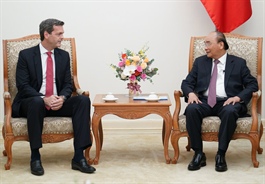Capturing the upside in a downturn
Capturing the upside in a downturn
The COVID-19 pandemic is undoubtedly the most severe health crisis we have encountered in our lifetime, unleashing the worse economic downturn since the Great Depression, and the virus became a recurring topic in the Monthly Briefing on the World Economic Situation and Prospects, where its severe direct and indirect economic impacts on specific sectors are discussed.

By Michael Piro COO, Indochina Capital
|
Tourism-related jobs and businesses were the first to experience the pandemic’s negative effects and most tourism and hospitality companies have struggled to keep afloat in response to the first waves of the outbreak.
Many had to take drastic measures to increase liquidity and improve cash flow to ensure survival. For real estate investors, restructuring and diversifying their portfolio has become a top priority for the survival and preparedness for the future, which remains uncertain despite more than half a year of facing the pandemic.
Mergers and acquisitions (M&A) have become an effective strategy to restructure and reposition a portfolio. Nonetheless, many investors are still holding back from releasing capital to complete M&A deals – on the one side there is a desire to reserve capital for precautionary reasons, but on the other side buyers and sellers do not always see eye-to-eye on the value of so-called “distressed assets.”
But having a smart, comprehensive and open-minded approach will help push deals to the finish line, creating value for all parties involved.

Deals launched during a downturn can drive growth and help businesses navigate the pandemic
|
A strategic enabler
Looking back to the dot-com crash and the 2008 financial crisis, investment lessons learned are that M&A practitioners who kept making deals, benefiting from lower valuations, outperformed their peers post-crisis. McKinsey’s report on over 1,000 global companies confirmed that those who regularly and systematically pursued moderately sized M&A deals deliver better shareholder returns than their counterparts, especially in a fast-moving business environment and during an economic recession – a recent PwC analysis also reached similar conclusions.
McKinsey’s report also highlighted the potential to use M&A to accelerate value creation and strategic shifts. The strategy seems to produce even better results when the company’s performance reaches its low.
The view that companies should pursue acquisitions during economic turmoil is contrary to traditional thinking; however, it is backed by experience from previous downturns, the relationship between M&A, various economic and financial drivers, and corporate success stories.
Deals launching during a downturn can drive growth and help businesses navigate through the pandemic to outperform industry peers. In fact, far more CEOs and investors complain about shifting and acting too little or too late instead of the opposite. According to the aforementioned PwC study, companies that made and announced deals in the first half of the 2001 US recession saw even better returns than peers who completed acquisition deals later on.
|
Keys for successful deals
Pivoting to the M&A business should be an ongoing commitment rather than a one-off project. Decisions related to potential acquisitions must follow criteria that were previously clearly defined. A one-off approach to M&A typically leads to subpar results – inexperienced and undisciplined buyers may just target one or two assets without applying what they learned from their previously completed deals.
Consistency and a well-designed plan for integration and expansion help immensely in achieving value.
Leading companies rotate portfolios steadily and avoid keeping them fixed, even in the face of economic turmoil – They identify and predict where the value creation will appear. On average, companies relying on organic growth underperform their peers, resulting in lower returns to shareholders.
Frequent transactions also provide access to the latest market intelligence and build discipline for portfolio management and corporate integration.
Additionally, opportunities should be considered in existing secondary businesses or in sectors similar or complementary to your core industry. For example, a real estate developer primarily engaged in the business of developing residential properties, usually with intent to sell or rent the property once the project is completed, can consider acquiring companies that will help them provide additional service offerings, such as operational management of residential property or sales of projects and products (brokerage).
Next, M&As should be considered when the company is underperforming to hasten strategic shifts. Contrary to the conventional mindset that companies must master their own businesses before acquiring others, underperforming and financially smaller businesses can leverage M&A activities to hasten their shift towards higher performance, improved margins and better shareholder returns.
Studies from different consultancy firms confirm that a gentle portfolio shift is not enough for companies suffering from poor economic performance; in fact, underperformers benefit the most from aggressive reallocation and higher-intensity focus on M&A.
Companies likely to emerge strong from the pandemic are those agile enough to adapt and keep up with market changes; and M&A is an effective tool to achieve this goal. Acknowledging that despite the hardships brought on by the pandemic, businesses should be looking to the long-term and focus on how they can achieve value when the economy bounces back.
M&A is one of the most effective business lines to take advantage of an economic downturn, where a diverse capital mix to finance deals will help companies reshape portfolios and accelerate strategic shifts for recovery.

























